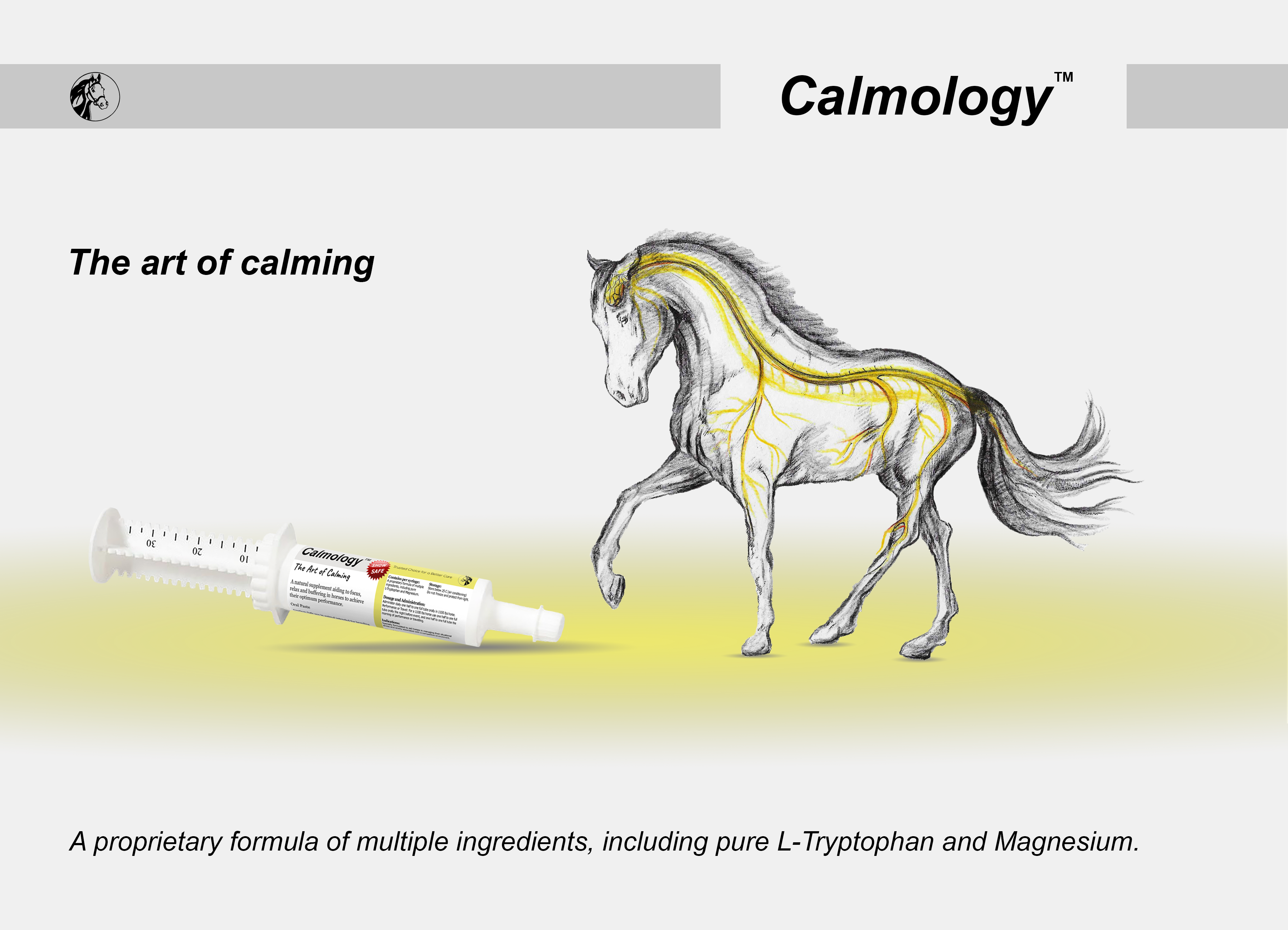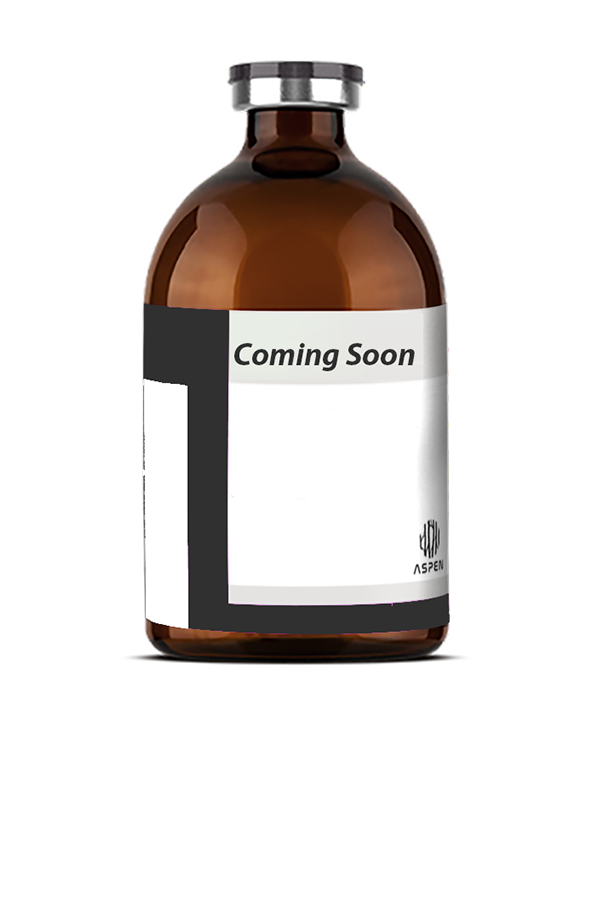
What is Calmology
Product Description:
CalmologyTMpaste is an essential nutrient amino acid that aids in relaxing nervous horses before competitions, exercise, showing or shipping. CalmologyTMpaste is highly recommended when it comes to these pastes, it contains no drugs and will not test positive in competition. CalmologyTM may not make the horse drowsy or hinder its performance.
Active Ingredient:
A proprietary formula of multiple ingredients, including pure L-Tryptophan and Magnesium.
What you should know:
Stress describes a negative condition that can have an impact on one’s mental and physical wellbeing, it is unclear as to what exactly defines stress and whether or not is a cause, an effect, or the process connecting the two. Horses, like people, suffer from stress and can become ill if they suffer too much of it. One should try to avoid or minimize the amount of stress our horses experience.
There are three main types of stress:
Constant stress
Occasional stress
Traumatic stress
Constant stress is a stress in which a horse is under repeatedly; often it is caused by a part of its daily routine. An example could be a horse that is being bullied by other horses in its pasture on a daily basis. This kind of stress can affect the horse’s behavior, making it nervous and difficult to handle. It can also affect its health resulting in the development of ulcers and reduction in the efficiency of its immune system.
Occasional stress is a stress which occurs from time to time, but not daily. The stress of transporting a horse to the occasional competition is an example of this kind of stress. Such stress, unless it is extreme normally has little effect on the horse once the event has passed. There are exceptions, if the stress conditions are repetitive such as an unpleasant experience every time it is taken to competition the horse may eventually develop an aversion to competitions.
Traumatic stress is a high stress event, such as a painful injury. These events can result in mental and behavioral issues. If a horse is injured while being transported it may develop a fear of trailers and refuse to enter them, this is an example of traumatic stress. It can also be caused by extreme fear, a horse that is very frightened, even if it suffers no injury, may develop the same mental and behavioral problems. Horses can suffer from several other types of stress as well such as isolation stress, social stress, boredom, change and uncertainty, training, noises and surprises, confinement and dark, and pain. The best way to control of stress is simply to remove the cause of stress. One should also provide a horse with an environment with lots of mental stimulation, in an environment which it feels safe and is controlled in a consistent way. In some cases, stress may result in or contribute to the development of behavioral issues. In this case the required control management depends on the type of behavioral issue and the individual horse.
However when one cannot simply remove the stress there are other options available to assist in calming a horse.These are supplements available in the form of pastes containing the essential amino acid L-tryptophan, this nutrient aids in relaxing nervous horses before racing, showing or shipping.
Indications:
For use by or under the direction of a registered veterinarian in selected cases in animals:
- To improve the managing of mood, anxiety, appetite and sleep as a natural anti-depressant
- Help horses maintain optimal nerves system health
- To manage the horse mood in a high stress event
Dosage and Administration:
Administer daily one half to one full tube orally in 1100 lbs horse.
Performance or Travel: For an 1100 lbs horse use one half to one full tube orally the night before event, and one half to one full tube the morning of performance or travelling.
Supplied:
32 ml oral paste.
Species:
Horses.
Storage:
Store below 25 C (air conditioning)
Do NOT freezeand protect from light.
Warning:
Not for human use.
Not for use in animalsintended for food.
CAUTION:
- Use this product by or on the order of a licensed veterinarian.
- This product is not intended to diagnose, treat, cure, or prevent any disease.
- Not to be used on pregnant mares.
- Keep this and all medications out of reach of children.
- These statements have not been evaluated by the Food and Drug Administration.
FOR VETERINARY USE ONLY
FOR PROFESSIONAL USE ONLY
Product Description:
CalmologyTMpaste is an essential nutrient amino acid that aids in relaxing nervous horses before competitions, exercise, showing or shipping. CalmologyTMpaste is highly recommended when it comes to these pastes, it contains no drugs and will not test positive in competition. CalmologyTM may not make the horse drowsy or hinder its performance.
Active Ingredient:
A proprietary formula of multiple ingredients, including pure L-Tryptophan and Magnesium.
How it works?
L- Tryptophan is also one of the 20 standard amino acids present in the body and used by cells to synthesize proteins. The body does not produce L- Tryptophan, it has limited abilities to regulate the amount of L- Tryptophan in cells. When limited amounts are ingested, tryptophan deficiency may be apparent, resulting in suppressed amounts of serotonin, melatonin, niacin, and other important molecules. Depression, unmanaged stress situations and sleep disorders may partially be caused by limited amounts of L- Tryptophan in the body. L- Tryptophan as a supplement is potentially safe. L-tryptophan and its metabolite 5-hydroxytryptophan (5-HTP), the immediate precursor of serotonin, have been used for improving management stress and sleep because serotonin is known to have multiple functions in the regulation of wake and sleep states. Because serotonin is a precursor of melatonin, sleep promotion through l-tryptophan administration may also result from increased melatonin levels. Serotonin (5-hydroxytryptamine, 5-HT) is another monoamine, but an indolamine rather than a catecholamine. The synthesis of serotonin parallels the synthesis of dopamine – hydroxylation followed by decarboxylation. Although the rate-limiting enzyme in serotonin synthesis is tryptophan hydroxylase rather than tyrosine hydroxylase, hydroxylation remains the rate-limiting step in its synthesis. Also, reuptake and, to a lesser extent, oxidation terminate serotonin activity.
Whereas the conversion of l-tryptophan to serotonin is limited by the availability of the metabolizing enzyme tryptophan hydroxylase and protein transporters that are shared with other amino acids, 5-HTP conversion is not limited by these factors and may be more efficiently converted to serotonin, although more research is needed on the clinical effects of this difference. Tryptophan depletion is often assumed to lead to a decrease in neuronal serotonin release in the brain. Many studies have since shown that the proportional presence of L-tryptophan over other amino acid groups leads to an increased release of serotonin. Tryptophan must pass from the bloodstream into the brain to be used as a precursor in the synthesis of serotonin. In order to traverse the blood-brain barrier, tryptophan competes with other amino acids for a carrier. Therefore, uptake depends on the relative presence of tyrosine, phenylalanine, valine, leucine and isoleucine. By increasing the tryptophan:large neutral amino acid ratio, the availability of tryptophan increases, producing greater concentrations of serotonin. As we know, serotonin then plays an essential role in the regulation of mood, anxiety, appetite and sleep, thus L-tryptophan has the properties of a natural anti-depressant.
What you should know:
Stress describes a negative condition that can have an impact on one’s mental and physical wellbeing, it is unclear as to what exactly defines stress and whether or not is a cause, an effect, or the process connecting the two. Horses, like people, suffer from stress and can become ill if they suffer too much of it. One should try to avoid or minimize the amount of stress our horses experience.
There are three main types of stress:
Constant stress
Occasional stress
Traumatic stress
Constant stress is a stress in which a horse is under repeatedly; often it is caused by a part of its daily routine. An example could be a horse that is being bullied by other horses in its pasture on a daily basis. This kind of stress can affect the horse’s behavior, making it nervous and difficult to handle. It can also affect its health resulting in the development of ulcers and reduction in the efficiency of its immune system.
Occasional stress is a stress which occurs from time to time, but not daily. The stress of transporting a horse to the occasional competition is an example of this kind of stress. Such stress, unless it is extreme normally has little effect on the horse once the event has passed. There are exceptions, if the stress conditions are repetitive such as an unpleasant experience every time it is taken to competition the horse may eventually develop an aversion to competitions.
Traumatic stress is a high stress event, such as a painful injury. These events can result in mental and behavioral issues. If a horse is injured while being transported it may develop a fear of trailers and refuse to enter them, this is an example of traumatic stress. It can also be caused by extreme fear, a horse that is very frightened, even if it suffers no injury, may develop the same mental and behavioral problems. Horses can suffer from several other types of stress as well such as isolation stress, social stress, boredom, change and uncertainty, training, noises and surprises, confinement and dark, and pain. The best way to control of stress is simply to remove the cause of stress. One should also provide a horse with an environment with lots of mental stimulation, in an environment which it feels safe and is controlled in a consistent way. In some cases, stress may result in or contribute to the development of behavioral issues. In this case the required control management depends on the type of behavioral issue and the individual horse.
However when one cannot simply remove the stress there are other options available to assist in calming a horse.These are supplements available in the form of pastes containing the essential amino acid L-tryptophan, this nutrient aids in relaxing nervous horses before racing, showing or shipping.
Indications:
For use by or under the direction of a registered veterinarian in selected cases in animals:
- To improve the managing of mood, anxiety, appetite and sleep as a natural anti-depressant
- Help horses maintain optimal nerves system health
- To manage the horse mood in a high stress event
Dosage and Administration:
Administer daily one half to one full tube orally in 1100 lbs horse.
Performance or Travel: For an 1100 lbs horse use one half to one full tube orally the night before event, and one half to one full tube the morning of performance or travelling.
Supplied:
32 ml oral paste.
Species:
Horses.
Storage:
Store below 25 C (air conditioning)
Do NOT freezeand protect from light.
Warning:
Not for human use.
Not for use in animalsintended for food.
CAUTION:
- Use this product by or on the order of a licensed veterinarian.
- This product is not intended to diagnose, treat, cure, or prevent any disease.
- Not to be used on pregnant mares.
- Keep this and all medications out of reach of children.
- These statements have not been evaluated by the Food and Drug Administration.
FOR VETERINARY USE ONLY






